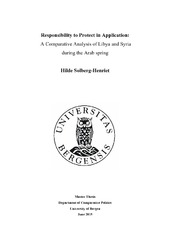Responsibility to Protect in Application: A Comparative Analysis of Libya and Syria during the Arab spring
Master thesis
Published version
Permanent lenke
https://hdl.handle.net/1956/10544Utgivelsesdato
2015-06-01Metadata
Vis full innførselSamlinger
Sammendrag
Responsibility to protect (RtoP) is a recent concept of international politics, whose goal is to define the best attitude to adopt when the world is confronted to grave humanitarian crises. Within RtoP, each state carries the primary responsibility to protect human beings living in its territory. The international society carries a collective duty to solve a humanitarian crisis when a state has failed to fulfil this responsibility. In order to proceed, the international society may need to use coercive action against the state. The objective of the master thesis is to better understand how the RtoP concept is being implemented in international affairs. For this purpose, it scrutinizes two recent humanitarian crises which have raised substantial concern in the international society. The Syrian conflict constitutes an evident case where the international society failed to fulfil its responsibility to protect. Populations suffering from mass atrocities and their consequences are left on their own, because the international society is being unable to respond collectively. In contrast, the RtoP had been used to justify international intervention in the Libya conflict in response to a threatening humanitarian crisis. The concept RtoP implies a series of conditions whose purpose is to grant legitimacy and effectiveness to an international intervention aimed at solving a humanitarian crisis. The master thesis examines how these conditions were met in the cases of Syria and Libya, and which of them proved to be determinant for triggering international intervention. The results of the study show that an intervention is critically conditioned by the existence of a consensus at the highest authority in international affairs. Mistrust between key states of the international society, but also poorly defined perspectives post-intervention, may underlie the lack of agreement which prevents collective action to solve a humanitarian crisis.
